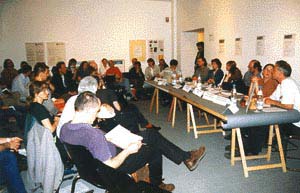![[Home]](../bilder/r2c-head1a.gif) ButIsItPolitics
ButIsItPolitics![[Home]](../bilder/r2c-head1a.gif) ButIsItPolitics
ButIsItPolitics
Text and Pic from url http://www.lot.at/politics/contributions/kath1.htm
from [ButIsItPolitics]. By Katharina Lenz/ WochenKlausur.
 Representatives of organizations of unemployed in Kunstamt Kreuzberg
Representatives of organizations of unemployed in Kunstamt Kreuzberg
Art and Concrete Intervention
Intervention Concerning (Un)employment
- Kunstamt Kreuzberg and NGBK, Berlin,Germany - 1998
For this project, WochenKlausur decided to focus upon the question of
unemployment respectively job creation as one of the most urgent fields of
the ongoing political and economic debates - worldwide and also locally in
Berlin as the growing new capital of re-united Germany. Kreuzberg is the
Berlin district with the highest rate of unemployment, the highest figures
when it comes to immigrants, mirrored in the media as a place of social
decay, inspite of a strong tradition of integrative initiatives and a
dense structure of welfare facilities.
Facing these facts, WochenKlausur elaborated a concept aiming at a
close connection between the actual situation of unemployed people and
their very individual needs on one hand and the development of new
perspectives or working fields on the other. Consequently, the so called
Workstation consists of two parts:
1. Info-Tank - a meeting space of advisement and assistance for the
local unemployed, to be built up at least in German and Turkish language
to start with, due to the social and ethnical structure of the area;
2. Think-Tank - a model thought to bring together highly motivated and
engaged professionals from different kinds of backgrounds, ready to face
the challenge of developing consistent and practicable examples of new
fields of employment. The idea is to form groups of five or six for each
new case. At the first meeting, the participants agree upon the specific
goal and a time schedule. For the starting group, WochenKlausur will
invite the first interested participants. For the long-term assistance of
the Think-Tank, a co-ordination team will be in charge of inviting further
groups. The co-ordinators keep in constant close contact with existing
initiatives and institutions, as well as with the public administration
area and representatives of commercial enterprises, in order to define
possible intervention fields. Adequate public relations and documentation
of the outcoming results are also part of their responsibilities.
The implementation of the Workstation itself already implies the
creation of four new jobs: two for the Info-Tank and further two for the
Think-Tank co-ordinators. As an experimental model focussed upon local
needs and potentials, it could be a small, but very concrete example for
the creation of new forms of subsistance.
Participants: Pascale Jeannee, Katharina Lenz, Christian Rupp, Michaela
Schweiger, Paul Stefanowske, Malte Willms, Andreas Zinggl
Back to MalteWillms